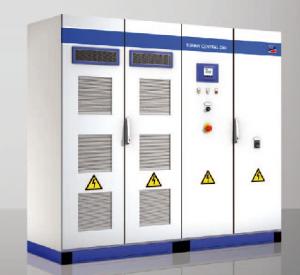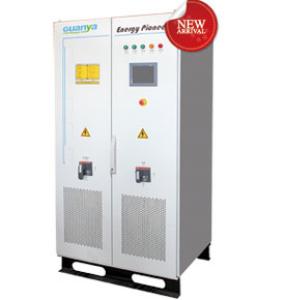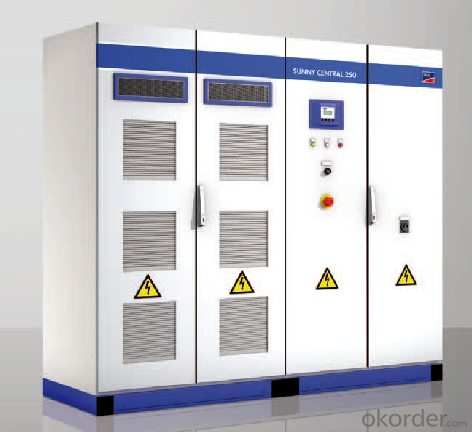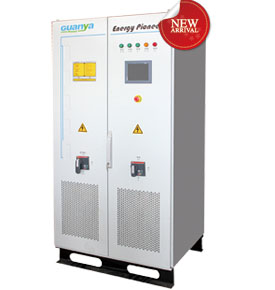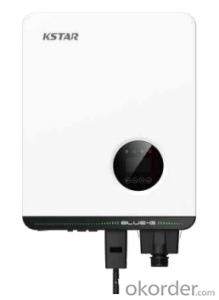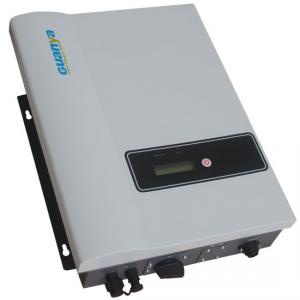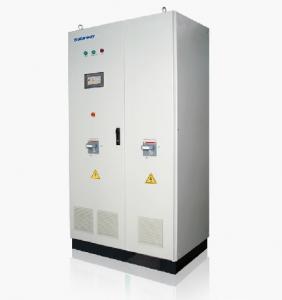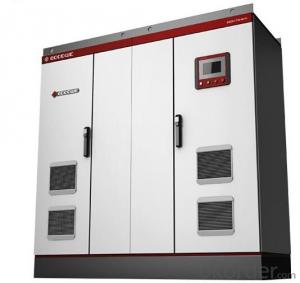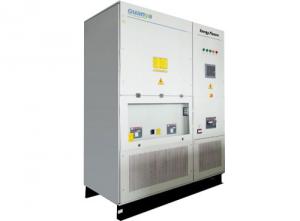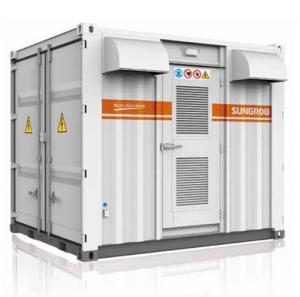SMS Solar Inverter - PV On-Grid Inverter GSG-250KTT with High Quality
OKorder Service Pledge
OKorder Financial Service
You Might Also Like
Description:
CNBMSOLAR is a world-leading and Vertical integrated manufacturer of high-performance with Silicon,
Wafer, Cells, Modules, which convert sunlight into electricity for residential, commercial, and utility-scale
power generation.
The capacity of CNBMSOLAR is reach to 1GW, and make sure each year our shipment capacity is more
Than 700-800MWs, at the same time, we have set up the largest solar power station with our partner
in Ukraine.
CNBM is a Quality + Service oriented company with“Excellence at Each Step” approach, composed of
the finest components from TUV and IEC-certified partners around the world, CNBM modules consistently
undergo a variety of trials at the company’s Test & Development Centre, ensuring peak performance
capabilities. The company is committed to develop and provide the world with clean and renewable energy
to ease the energy shortages as well as human kind’s impact on the environment.
Data:
Isolation mode | Frequency transformer isolation | rated power | 250(KW) |
Max. DC. input power | 275(KW) | Max. input voltage | 900(VDC) |
Max. input current | 625(A) | Max. PV parralle module number | —— |
recommend PV module power | 720(VDC) | MPPT range | 440~850(VDC) |
Rated AC output power(KW) | 250(KW) | Max. output power | 275(KW) |
rated Grid voltage(VAC) | 400/480 | rated Grid frequency(Hz) | 50/60 |
Max efficiency | 97.00% | Euro efficiency | 96.00% |
Display | Touch screen | THD | <3% |
Power factor | ≥0.99 | MPPT Precision | 99% |
communication interface | RS485;RS232 | electromagnetic compatibility | IEC61000-6-1/-2/-3/-4 |
grid disruption | IEC61000-3-2/-3 | grid detection | DIN VDE 0126 |
overload operating | Automatically adjust the running peak | internal consumption at night | <80(W) |
DC voltage ripple | Vpp < 10% | protection class | IP20(outdoors) |
Anti-islanding protection | Vac;Fac | cooling concept | Forced air cooling |
operating temperature range | —20℃~55℃(>50℃drop) | operating humid range | 0~95%(non-condensing) |
Dimensions(DxWxH) | 800×1800×2140mm | weight | 2486(Kg) |
altitude | 6000m,>3000m start to drop |
|
|
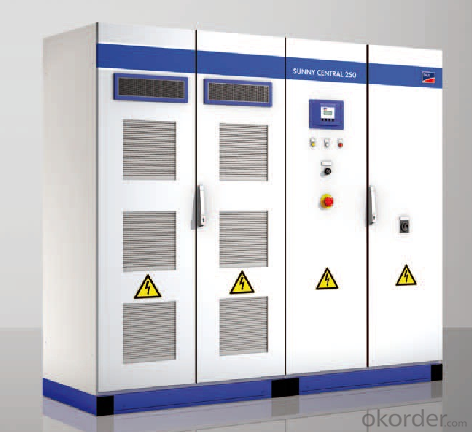
FAQ:Could you pls introduce CNBM ?
CNBM Group is short for China National Building Materials Group Corporation, which is established in 1984 with approval from the State Council
CNBM Group is the largest comprehensive building materials industry group in China
The Group has a total asset of over RMB 360 billion, more than 180,000 employees and 17 subsidiaries
- Q: Can a solar inverter be used with different types of backup power sources?
- Yes, a solar inverter can be used with different types of backup power sources such as batteries, generators, or the utility grid. The inverter's role is to convert the DC power generated by solar panels into AC power that can be used by household appliances or fed back into the grid. It can seamlessly switch between different power sources, ensuring uninterrupted power supply and maximizing the utilization of renewable energy.
- Q: Can a solar inverter be used in areas with frequent power outages?
- Yes, a solar inverter can be used in areas with frequent power outages. Solar inverters have the ability to convert the direct current (DC) power generated by solar panels into alternating current (AC) power that can be used to operate electrical devices. During power outages, the solar inverter can continue to provide electricity from the solar panels, allowing for uninterrupted power supply. However, it is important to note that a battery storage system may be required to store excess solar energy for use during periods of low sunlight or at night when the solar panels are not producing electricity.
- Q: Can a solar inverter be used with solar-powered air conditioning systems?
- Yes, a solar inverter can be used with solar-powered air conditioning systems. The solar inverter is responsible for converting the direct current (DC) generated by the solar panels into alternating current (AC) that can be used to power various electrical appliances, including air conditioning units. By connecting the solar inverter to the solar panels and the air conditioning system, the generated solar energy can be efficiently utilized to power the AC system.
- Q: Can a solar inverter be used with concentrated solar power systems?
- Yes, a solar inverter can be used with concentrated solar power systems. Concentrated solar power (CSP) systems use mirrors or lenses to concentrate sunlight onto a receiver, which then converts the sunlight into heat. This heat can then be used to generate electricity through various means, including steam turbines. In order to convert this heat-generated electricity into the required alternating current (AC) for use in homes and businesses, a solar inverter is needed. Therefore, a solar inverter is an essential component in connecting and integrating the electricity generated by concentrated solar power systems into the power grid.
- Q: Can a solar inverter be used with a solar-powered street lighting system?
- Yes, a solar inverter can be used with a solar-powered street lighting system. A solar inverter is responsible for converting the DC power generated by solar panels into AC power, which is necessary for powering street lights. By integrating a solar inverter, the solar-powered street lighting system can efficiently convert and utilize the energy generated by the solar panels, ensuring the proper functioning of the lights.
- Q: How does a solar inverter protect against power surges?
- A solar inverter protects against power surges by incorporating surge protection devices and circuitry within its design. These devices are designed to detect and divert excessive voltage levels caused by power surges, thereby preventing damage to the inverter and the connected solar panels.
- Q: What certifications should a solar inverter have?
- A solar inverter should have certifications such as UL 1741, IEC 62109, and IEEE 1547 to ensure its safety, reliability, and compliance with industry standards. Additionally, certifications like ISO 9001 and ISO 14001 can demonstrate the manufacturer's commitment to quality and environmental management.
- Q: Can a solar inverter be used with a solar-powered emergency lighting system?
- Yes, a solar inverter can be used with a solar-powered emergency lighting system. The solar inverter is responsible for converting the direct current (DC) generated by the solar panels into alternating current (AC) which is required to power the emergency lighting system. This allows the system to store and utilize the solar energy effectively, ensuring uninterrupted power supply during emergencies.
- Q: How does a solar inverter handle different temperature conditions?
- A solar inverter is designed to handle different temperature conditions by employing various thermal management techniques. It typically has built-in cooling systems such as fans or heat sinks to dissipate excess heat. Additionally, advanced inverters may employ temperature sensors to monitor the internal temperature and adjust their operations accordingly. These temperature compensation features allow the inverter to maintain optimal performance and efficiency across a wide range of temperature conditions.
- Q: Can a solar inverter be used in off-grid systems?
- Yes, a solar inverter can be used in off-grid systems. In off-grid systems, solar inverters are essential as they convert the direct current (DC) generated by the solar panels into alternating current (AC) that can be used to power appliances and devices. They also play a crucial role in managing the battery storage and regulating energy flow in off-grid setups.
Send your message to us
SMS Solar Inverter - PV On-Grid Inverter GSG-250KTT with High Quality
OKorder Service Pledge
OKorder Financial Service
Similar products
Hot products
Hot Searches
Related keywords
